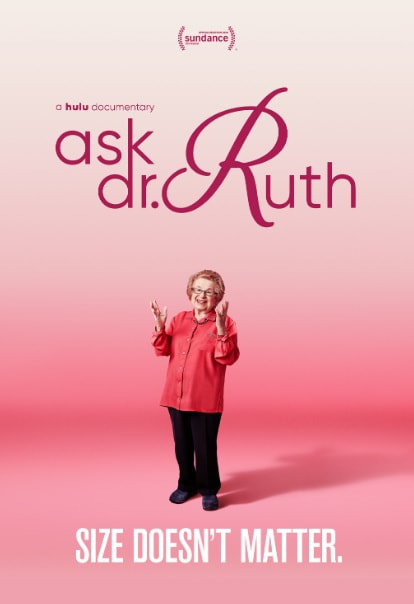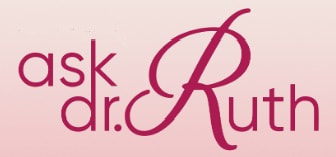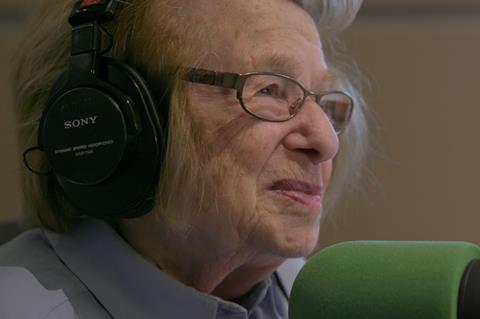ASK DR. RUTH
Monday, June 17, 7:30 pm

Reviewed by Josh Modell / AV Film
It can be hard to remember—or probably for younger people to even imagine—a time before the Pandora’s box of the internet opened, putting every conceivable bit of information, sexual and otherwise, at the world’s fingertips. But when Dr. Ruth Westheimer entered the public consciousness in the 1980s, she was something of a pioneer. Sure, there was sex advice available, but the diminutive German struck a nerve by being plainspoken and decidedly non-salacious, even as she advocated for masturbation, sex toys, and pretty much anything that two consenting adults wanted to do. She encouraged listeners to reject sexual shame with the mantra, “There’s no such thing as normal.”
From a pop culture standpoint, it’d be easy to gloss over her career as an ’80s lark, lumping her in with Clara “Where’s the Beef?” Peller as a punchline to a loud, goofy decade. But as Ask Dr. Ruth shows, Westheimer’s life was far more interesting—and her impact on the world far deeper—than the quick giggle that a thick accent curling delightfully around the word “vibrator”can provide. (Though that’s pretty great, too.)
Documentarian Ryan White (Good Ol’ Freda, The Case Against 8) followed Westheimer as her 90th birthday approached, and Ask Dr. Ruth lets the doctor herself do most of the heavy lifting in her life story. It wouldn’t make sense any other way, really: Westheimer is so delightfully vibrant that watching her talk couldn’t be more fun—it’s especially great when she cheerfully chides White with lines like, “What a stupid thing to ask. Next question!”
But Westheimer’s origins don’t foreshadow the happy, direct person she would become. Born in Germany to Jewish parents in 1928, the former Karola Siegel was sent to Switzerland as Hitler rose to power. Though she exchanged letters with her parents, she would never see them again—as she confirmed many years later, they were murdered in the Holocaust. But even Westheimer’s years in the Swiss orphanage aren’t covered in a woe-is-me way by the doc; after all, she used the time to learn, even when that meant gaining secondhand knowledge from a boyfriend, since girls weren’t allowed to attend high school. These years are brought to life by Ask Dr. Ruth with dreamy, storybook-like animations—a dramatically overused documentary technique that mostly works in this case.
Of course, for the later stretches of Westheimer’s life, there’s no need for cartoons: Personal photos and home movies document her moves to Israel—where she trained as a sniper!—and to Paris, as well as two marriages that ended in divorce. She landed in New York in 1956, but didn’t become “Dr. Ruth” until 1981. (A delightful detail: She’s lived in the same Washington Heights apartment for 50 years, sticking to a neighborhood she knew and loved even after becoming rich and famous.) That was the year she volunteered to host a late-night radio show, whose fluke success led to an unexpected career not just in radio but also TV and books. For a few years, she was inescapable, showing up to talk sex with Johnny Carson, David Letterman, and Conan O’Brien, on whose show she tried to coin the term “blue lips.”
But underneath the fun, funny exterior, Westheimer was always advocating, and never subtly. Whether trying to convince MTV’s “Downtown” Julie Brown to express her desires in the bedroom or flatly telling a talk-show audience that AIDS affects everyone and not just the gay community, she was tireless in her determination to educate people about sexual issues. She’s been unwavering in her support of gay rights, reproductive rights, and empowerment of women, though much to her granddaughter’s chagrin, she resists labeling herself a feminist. More than once in Ask Dr. Ruth, she’s told that her advice—and really just her very existence—saved someone’s life, and she happily accepts that claim as true. She knows that she’s been a force for good in the world, for acceptance and equality. As a documentary, Ask Dr. Ruth has it kind of easy: It’s got an enchanting subject eager to tell a fascinating story.
It can be hard to remember—or probably for younger people to even imagine—a time before the Pandora’s box of the internet opened, putting every conceivable bit of information, sexual and otherwise, at the world’s fingertips. But when Dr. Ruth Westheimer entered the public consciousness in the 1980s, she was something of a pioneer. Sure, there was sex advice available, but the diminutive German struck a nerve by being plainspoken and decidedly non-salacious, even as she advocated for masturbation, sex toys, and pretty much anything that two consenting adults wanted to do. She encouraged listeners to reject sexual shame with the mantra, “There’s no such thing as normal.”
From a pop culture standpoint, it’d be easy to gloss over her career as an ’80s lark, lumping her in with Clara “Where’s the Beef?” Peller as a punchline to a loud, goofy decade. But as Ask Dr. Ruth shows, Westheimer’s life was far more interesting—and her impact on the world far deeper—than the quick giggle that a thick accent curling delightfully around the word “vibrator”can provide. (Though that’s pretty great, too.)
Documentarian Ryan White (Good Ol’ Freda, The Case Against 8) followed Westheimer as her 90th birthday approached, and Ask Dr. Ruth lets the doctor herself do most of the heavy lifting in her life story. It wouldn’t make sense any other way, really: Westheimer is so delightfully vibrant that watching her talk couldn’t be more fun—it’s especially great when she cheerfully chides White with lines like, “What a stupid thing to ask. Next question!”
But Westheimer’s origins don’t foreshadow the happy, direct person she would become. Born in Germany to Jewish parents in 1928, the former Karola Siegel was sent to Switzerland as Hitler rose to power. Though she exchanged letters with her parents, she would never see them again—as she confirmed many years later, they were murdered in the Holocaust. But even Westheimer’s years in the Swiss orphanage aren’t covered in a woe-is-me way by the doc; after all, she used the time to learn, even when that meant gaining secondhand knowledge from a boyfriend, since girls weren’t allowed to attend high school. These years are brought to life by Ask Dr. Ruth with dreamy, storybook-like animations—a dramatically overused documentary technique that mostly works in this case.
Of course, for the later stretches of Westheimer’s life, there’s no need for cartoons: Personal photos and home movies document her moves to Israel—where she trained as a sniper!—and to Paris, as well as two marriages that ended in divorce. She landed in New York in 1956, but didn’t become “Dr. Ruth” until 1981. (A delightful detail: She’s lived in the same Washington Heights apartment for 50 years, sticking to a neighborhood she knew and loved even after becoming rich and famous.) That was the year she volunteered to host a late-night radio show, whose fluke success led to an unexpected career not just in radio but also TV and books. For a few years, she was inescapable, showing up to talk sex with Johnny Carson, David Letterman, and Conan O’Brien, on whose show she tried to coin the term “blue lips.”
But underneath the fun, funny exterior, Westheimer was always advocating, and never subtly. Whether trying to convince MTV’s “Downtown” Julie Brown to express her desires in the bedroom or flatly telling a talk-show audience that AIDS affects everyone and not just the gay community, she was tireless in her determination to educate people about sexual issues. She’s been unwavering in her support of gay rights, reproductive rights, and empowerment of women, though much to her granddaughter’s chagrin, she resists labeling herself a feminist. More than once in Ask Dr. Ruth, she’s told that her advice—and really just her very existence—saved someone’s life, and she happily accepts that claim as true. She knows that she’s been a force for good in the world, for acceptance and equality. As a documentary, Ask Dr. Ruth has it kind of easy: It’s got an enchanting subject eager to tell a fascinating story.
DISCUSSION FOLLOWS EVERY FILM!
$6.00 Members / $10.00 Non-Members
TIVOLI THEATRE
5021 Highland Avenue I Downers Grove, IL
630-968-0219 I www.classiccinemas.com
We apologize—Movie Pass cannot be used for AHFS programs.
$6.00 Members / $10.00 Non-Members
TIVOLI THEATRE
5021 Highland Avenue I Downers Grove, IL
630-968-0219 I www.classiccinemas.com
We apologize—Movie Pass cannot be used for AHFS programs.







